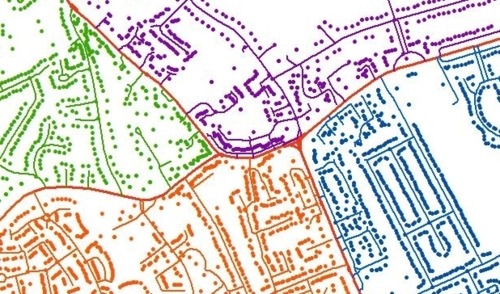
Subsequent to my post in March, a few additional details have emerged on Royal Mail’s Positional Data Capture project. The objective of this project is to collect location information for all Royal Mail delivery address points in the UK.

Last week a Communication Workers Union (CWU) representative posted a Deployment Guidelines document on the RoyalMailChat online message board. (Free registration required to view the full message.)
Following is an edited extract of key points:
Branches may be aware of the previous trial regarding the Positional Data Capture (PDC) initiative which took place in London, Cardiff and Lampeter last year. PDC is part of the new products and services strategy and will seek to establish Royal Mail as a major player in the positional data market; currently worth £100m a year and growing. This information is commercially attractive to Royal Mail who intends to sell the data captured to a host of organisations and companies who have shown an interest in obtaining this information.
Royal Mail, as the Universal service Provider for the UK, has a significant advantage over any other delivery or logistics company in that it has access to 28.2 million address points and has data systems such as A plus which capture every post coded delivery point in the UK. This information will be used to overlay positional data information, such as the address point and the delivery access point using satellite technology GPRS.
National Objectives
- To capture all address points and access points circa 28.2m
- To achieve data accuracy of c95% accurate to within <5m
- To achieve 60% positive experience from the volunteers involved in PDC covering training and use of the technology.
- To provide a commercially viable product and enhance Royal Mail’s portfolio of products and services
Locations
All Royal Mail Delivery Office locations will be covered.
Duration
The deployment will be divided into 2 phases, timeline highlighted below.
Anglia = 02/07/12 – 24/09/12
Thames Valley, South East, South West, London, Wales, Midlands, North West England, North East England, Scotland and Northern Ireland = 03/09/12 – 30/06/13
The programme outlined above is still provisional and is subject to change.
In addition to the above information, Nigel Pindar (Solutions Architect on the PDC project from May 2011 to March 2012) has posted the following note to his LinkedIn profile. (I’ve added the vendor links.)
Positional Data Capture (PDC) is a new Royal Mail product-offering, providing hitherto unachievable levels of GPS data accuracy for the UK’s 28.8 million addresses. It uses GPRS or WiFi to upload data from mobile devices to a PHP/Java, Windows, Apache & MySQL based Web Portal hosted on a PaaS infrastructure provided by BT.
This is a £10m project which will enable RMG to move into a completely new market, providing GPS data to a variety of new customers.
I authored both the Logical Design and Physical Design documentation, successfully taking them through RMG’s gated project management process and achieving sign-off on them.
I am RMG’s solutions/technical lead liaising with vendors; Trimble (the application vendor), BT, CSC, AFD and Accenture; ensuring that the solution components they’re supplying will integrate successfully with each other.
I’m assuming the above description applies only to the technology and vendors involved in the project to capture the data, and not to any proposed customer solution. It remains unclear what services or products Royal Mail plans to offer to the location intelligence market once it has successfully captured and cleansed the data.
It will be interesting to see whether Royal Mail decides to focus simply on production of address data sets for use in third-party software, i.e. in direct competition with the National Address Gazetteer (NAG) and Ordnance Survey’s AddressBase products, or whether it also intends to offer the data as part of its own software/service proposition.
I’m very skeptical that this project will produce a national geo-referenced address data set with higher positional accuracy than the existing NAG and AddressBase products. Any large data set produced from a mass labour effort is likely to be of variable quality. However it’s certainly plausible that the Royal Mail data will be competitive in much of the market for this type of information.
A particular selling point for Royal Mail will be the inclusion of address location data for Northern Ireland, since the existing available products only cover Great Britain. On the other hand Royal Mail is only collecting location data for postal delivery points, and missing out the 1.5 million or so “objects without postal addresses” included in the Plus and Premium versions of AddressBase. My current best guess is that Royal Mail will present its positional data as an added-value alternative for existing PAF customers and as a lower-price alternative for commercial licensees of the basic version of AddressBase.